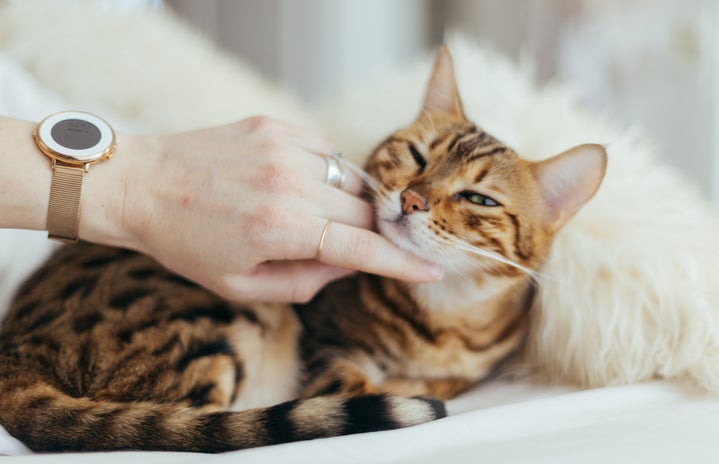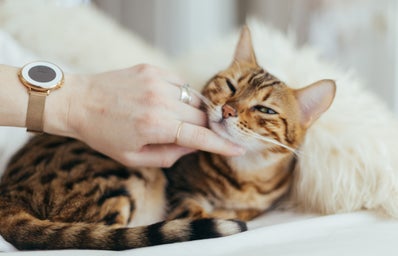Ever since I was young, I’ve wanted a pet. I have an unspeakable affinity for animals, and I’ve always wanted one to call my own. Alas, my parents weren’t really keen on having animals in the home, so no matter how much I begged for a pet when I was a kid, they wouldn’t budge on the matter. Every birthday, holiday, or special occasion, I’d ask for a pet. In everyday conversations, I would bring it up. But they would always come up with excuses upon excuses for why we couldn’t get a pet: I wasn’t responsible enough to take care of them, pets are messy and would wreak havoc in the household, they’re too expensive…
See, I’m part of a Middle Eastern family, and pets aren’t really viewed the same way in the Middle East as they are in Canada or the US. Typically, they’re not really thought to belong in the household, and they’re often seen as dirty. People in the Middle East don’t usually own pets, and when they do, they’re usually outdoor pets that aren’t allowed to enter the house. So, when exposed to the seemingly limitless love Westerners seem to have for animals and their pets, Middle Easterners are pretty weirded-out. I get maybe owning one pet, but how could they own multiple at a time, they ask. Their dogs are so massive, how do they let them inside their house? I could never own a big dog, they’re like sheep; if anything, I’d get a small one. I get owning a cat, but dogs are dirty! Look how they slobber, it’s so gross!
My cousins have a dog named Spike, and once when I was at their house, I witnessed one of the funniest and most cartoonish examples of the dislike some Middle Easterners harbor for animals. A bunch of other visitors were over, and one of them really didn’t like dogs, so Spike was kept on a leash for a little bit while she was there. Without any provocation, this visitor scowled at Spike and repeatedly muttered to him that she doesn’t like him. I thought it was hilarious because a) it was completely unprovoked—Spike was minding his own business and didn’t do anything to her!—and b) she felt a weird need to tell him she didn’t like him, as if he could understand her, or even needed to know about her feelings for him! But anyway, I think you get the picture now about how some people in Middle Eastern culture feel about pets.
Now, I’m not saying my parents are animal-haters, but if you come from a culture that thinks this way about animals, it takes a while to warm up to the idea of owning a pet. Well, after a very short wait of 22 years, my parents have finally relented, and we brought home our first pet a few weeks ago. (Spike, my cousins’ dog, definitely helped convince them). We adopted a 1-year-old black cat named Kiwi from our local Humane Society.
Adopting our first pet has presented quite the learning curve, and we’ve had to overcome a few hurdles. For example, we weren’t initially successful in our efforts to adopt a pet. Originally, we submitted an application for a 6-year-old cat named Daisy. We met her at a local PetSmart location, and we could tell she was really affectionate. On the Humane Society’s website, we also figured out that cats’ personalities were classed into a few different categories: private investigator, secret admirer, sidekick, and personal assistant. Daisy was described as a personal assistant—a super loving cat that would constantly stay at your side—so we knew she would be perfect for us. We started to get worried when we didn’t hear back from the Humane Society multiple days after we submitted our application. Turns out someone else had submitted an application before us, so we weren’t able to adopt her. However, we managed to find another so-called personal assistant—Kiwi—so we adopted him and didn’t look back.
After these adoption struggles, we had to figure out what Kiwi’s personality was like and how we could best care for him. Hell, we weren’t even totally sure what cats were like in general, much less our own lil’ furball! Adopting can be tricky because you won’t necessarily know everything about your pet’s personality before you adopt them. Your adoption agency has no way of knowing exactly how your pet will behave once they’re in your home, so there could definitely be some surprises along the way. This is not a reason not to adopt—after all, it’s always better to adopt than shop—but in the interest of full disclosure, it’s important to mention. We were told, for example, that Kiwi, like many animals at the Humane Society, used to be a stray, so he didn’t have a previous owner who could tell the adoption agency what he was like in a home environment.
After we brought Kiwi home, it was quickly confirmed to us that he was definitely the “personal assistant” cat he was described as—he loved being pet, and he could easily spend the entire day with you. However, in the course of a few days, we discovered that he’s also a very high-energy cat, and that he gets easily bored if you don’t play with him often and provide him with enough entertainment. He likes receiving love and attention, but if given the choice, he would choose to play rather than be cuddled. This isn’t something we expected or could have known beforehand, so we’ve had to adapt and learn how to keep Kiwi engaged as first-time pet owners.
Finally, the unthinkable happened when Kiwi ran away a week after we adopted him, and we had to figure out how to find him and bring him home. Somehow, he slipped out of the front door, and none of us even noticed until we realized we hadn’t heard or seen him for half an hour. We were devastated—our very first pet had escaped after a single week of us having him. We spent the entire day searching for him in the neighborhood, putting up posters, and passing out flyers to neighbors. We had grown very attached to Kiwi very quickly—my parents included—and now that he was gone, we could barely function. After 5 days of fruitless searching, we found him playing on our sidewalk, and coaxed him indoors with some treats. He was home safe and sound, and looked like he had even gained a few pounds (what or who he ate during his escapade was beyond us). In hindsight, it made sense that Kiwi had run away—he was a stray accustomed to the outdoors, and our house just wasn’t interesting enough to satisfy his playful nature. We learned that the hard way, so we’ve tried to incorporate more play into his routine since his great escape.
Kiwi ended up getting sick a week after coming home, so we had to quickly figure out how vet care and pet insurance work and get him treatment. That he got sick wasn’t a surprise, since he was out during a week of rain and thunderstorms. We didn’t know cats got sick in the same way as humans do though, so we were surprised to see him sneezing and dripping boogers like a fuzzy toddler with a flu. He is now feeling much better thanks to some medication, and is back to his energetic self.
It’s now been about a month since we’ve had Kiwi, and I don’t think we could ever go back to not having a pet. He brings so much joy into our household, and his playfulness reawakens the children in us. Even when he bounces off the walls, tries to get into the sink so he can lick the leftover food on the dishes, hides behind a wall while waiting to jump at me, or attempts to bolt out the house again, I love him.


